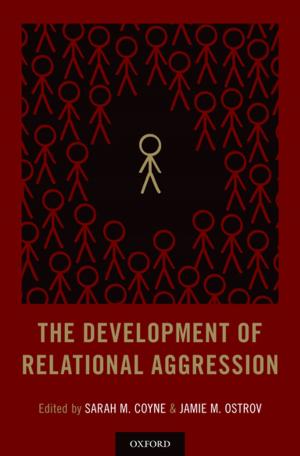Family Relationships
An Evolutionary Perspective
Nonfiction, Health & Well Being, Psychology, Social Psychology, Social & Cultural Studies, Social Science, Anthropology| Author: | ISBN: | 9780190295684 | |
| Publisher: | Oxford University Press | Publication: | September 14, 2007 |
| Imprint: | Oxford University Press | Language: | English |
| Author: | |
| ISBN: | 9780190295684 |
| Publisher: | Oxford University Press |
| Publication: | September 14, 2007 |
| Imprint: | Oxford University Press |
| Language: | English |
Kinship ties-the close relationships found within the family-have been a central focus of evolutionary biological analyses of social behavior ever since biologist William Hamilton extended the concept of Darwinian fitness to include an individual's actions benefiting not only his own offspring, but also collateral kin. Evolutionary biologists consider organisms not only reproductive strategists, but also nepotistic strategists. If a person's genes are just as likely to be reproduced in her sister as in her daughter, then we should expect the evolution of sororal investment in the same way as one expects maternal investment. This concept has revolutionized biologists' understanding of social interaction and developmental psychologists' understanding of the family. However, kinship ties have largely been ignored in other areas of psychology, particularly social psychology. Family Relationships brings together leading theorists and researchers from evolutionary psychology and related disciplines to illustrate the ways in which an evolutionary perspective can inform our study and understanding of family relationships. The contributors argue that family psychology is relationship specific: the relationship between mother and daughter is different from that between father and daughter or that between brother and sister or sister and sister. In other words, humans have evolved specialized mechanisms for processing information and motivating behavior that deal with the distinct demands of being a mate, father, mother, sibling, child, or grandparent. Such an evolutionary perspective on family dynamics provides a unique insight into human behavior. This volume will be an indispensable resource for psychologists, sociologists, and anthropologists, as well scholars of family, marriage, and animal behavior.
Kinship ties-the close relationships found within the family-have been a central focus of evolutionary biological analyses of social behavior ever since biologist William Hamilton extended the concept of Darwinian fitness to include an individual's actions benefiting not only his own offspring, but also collateral kin. Evolutionary biologists consider organisms not only reproductive strategists, but also nepotistic strategists. If a person's genes are just as likely to be reproduced in her sister as in her daughter, then we should expect the evolution of sororal investment in the same way as one expects maternal investment. This concept has revolutionized biologists' understanding of social interaction and developmental psychologists' understanding of the family. However, kinship ties have largely been ignored in other areas of psychology, particularly social psychology. Family Relationships brings together leading theorists and researchers from evolutionary psychology and related disciplines to illustrate the ways in which an evolutionary perspective can inform our study and understanding of family relationships. The contributors argue that family psychology is relationship specific: the relationship between mother and daughter is different from that between father and daughter or that between brother and sister or sister and sister. In other words, humans have evolved specialized mechanisms for processing information and motivating behavior that deal with the distinct demands of being a mate, father, mother, sibling, child, or grandparent. Such an evolutionary perspective on family dynamics provides a unique insight into human behavior. This volume will be an indispensable resource for psychologists, sociologists, and anthropologists, as well scholars of family, marriage, and animal behavior.















